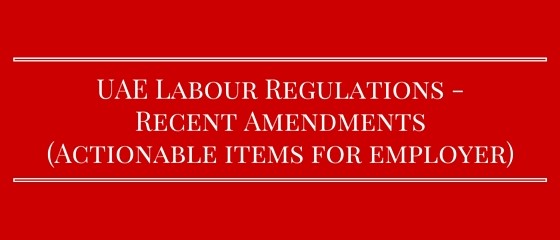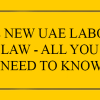In UAE Federal Law No. 08 of 1980, as amended (the “UAE Labour Law”) governs the relationship between the employer and the employee.
Three new ministerial decrees containing new set of rules for labour market issued by the UAE’s Ministry of Labour (MoL) came into force on 1st January this year and are expected to alter the contractual relationship between employers and workers in the UAE.
Although these decrees do not amend the UAE Labour Law (which is the primary piece of legislation governing the employer-employee relationship), it will have noticeable impact on how the relationship between the employer and the employee is structured.
These decrees are:
(a) The Ministerial Decree No. 764 0f 2015 in relation to MoL employment contract,
(b) The Ministerial Decree No. 764 of 2015 in relation to termination of employment, and;
(c) The Ministerial Decree No. 765 of 2015 in relation to labour mobility.
The new rules primarily focus on making contractual obligations between employers and the 4.6 million foreign workers (source: Arabian Business) clearer and more transparent and to provide a framework which encourages greater flexibility in foreign workers’ ability to legally find new work.
I will list out actionable items first (which the employer are advised to follow-up on) and then the key take-away from the recent changes.
(A) Action to be taken to the employers
1. If the employee is engaged on original fixed term contract (meaning the first term which is not yet renewed) nothing needs to be done until the time of renewal.
At the time of renewal the employer would be required to comply with the new template for renewal under which a new “notice period” and “termination payment” needs to be agreed.
2. If the employee is on renewed fixed term contract, the parties concerned will be given more flexibility when terminating it.
Both parties will be allowed to end the contract before the expiry date by giving notice of one to three months and a termination payment (of again one to three months) which both parties have to agree to.
To take the benefit of this provision, employers are advised to do suitable amendment to the employment contract to minimise the risk.
This should include agreeing on “notice period” and “termination payment”.
Failing to do this will trigger the default notice period of 3 months and an additional termination payment of 3 months.
3. If the employee is on un-limited term contract than at the time of renewal employer need to take into consideration the maximum allowable notice period which is now 3 months.
This would create problems when the employee holds senior position within the organisation as finding a replacement and handing-over the work to him would be difficult in this short period of time.
(B) Key take-away and points to ponder
4. There are now three types of MoL employment contract for different scenarios:
(a) Original fixed term,
(b) Renewal of fixed term, and;
(c) Un-limited Term Contract.
These contracts are significantly detailed than the previous template. Previously only one contract was there and it was used for both fixed term and un-limited term.
5. The employer needs to submit the offer letter to MoL before it can be issued to the new employee. The offer letter should be compliant with the MoL contract.
The MoL contract must reflect the terms of the offer letter.
There was no such requirement before.
Moreover the contracts cannot be changed, modified or substituted in any way unless Ministry approval is granted and the changes are in compliance with the existing UAE Labour Law and other applicable resolution.
The main purpose of this text is to likely protect the worker from ambiguities in work conditions and arbitrary changes to those work conditions at any time after a worker has started work with an employer.
6. Minimum notice period is one month and maximum notice period is now 3 months. Previously, only minimum notice period of 30 days was there for un-limited term contract. There was no notice period of fixed term contract and no maximum notice period of un-limited term contract.
7. It is unclear whether the Decrees will immediately apply to the employment contracts which was entered before the Decrees came into force (i.e., before 31st December 2015).
8. Some parts of the Decrees are not in sync with the UAE Labour Law.
As examples:
(a) the UAE Labour Law provides that fixed term contract can be of up to 4 years; however the Decree 765 states that it can only be up to 2 years.
(b) The maximum notice period of 3 months is provided in Decree 765. In contrast the UAE Labour Law do not provided an upper limit on notice period.
It is unclear whether the Decrees or UAE Labour Law will take precedence. The MoL will likely follow the text of the Decrees however it is yet to be tested how the courts will interpret the text of Decrees which is not-compliant with the UAE Federal Labour Law.
More detailed analysis of these recent changes can be viewed by clicking Limited term contracts in the UAE and (New Year, New Employment Laws: Your Guide to the Key Changes).
9. The main focus of Ministerial Decree 766 is on worker mobility as it establishes rules on work permits granted for work with new employers.
Previously, foreign workers who had lost their job for a variety of reasons would have found themselves in a difficult position as the work permit was tied to their previous employer.
Decree 766 makes it easier for such workers to begin a new work contract with another employer. The Decree outlines the main points of the change in the law as it applies to new work permits.
In each of the following situations, a new work permit with a fresh employer may be granted by the Ministry.
If either a term or non-term contract has come to a natural end.
If both worker and employer have mutually agreed to end a contract, as in Decree 765 above, and as long as the worker has already completed a minimum of 6 months’ work with that employer. This required of 6 months is not applicable to employee of level 1 (holder of a University degree), level 2 (post-secondary school diploma) and level 3 (secondary school diploma).
If the worker’s contract has been terminated by his or her employer for no reason and without notice.
If the employer has failed to provide work for at least 2 months because of an inactive workplace and the worker has approached the Ministry about the situation.
If the employer fails to fulfill legal and contractual obligations which include not paying the worker for more than 60 days.
If a labour complaint has been referred to the Labour Court by the Ministry and the case is ruled in favour of the worker.
In the event that a new contract between an employer and employee needs to be created, it is best to use a suitably qualified employment lawyer in Dubai for the purpose.






